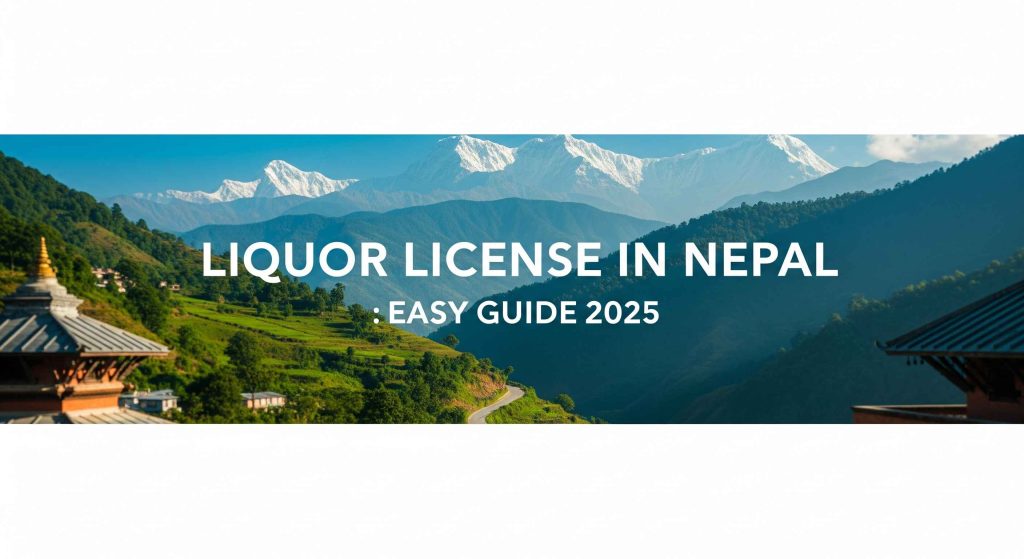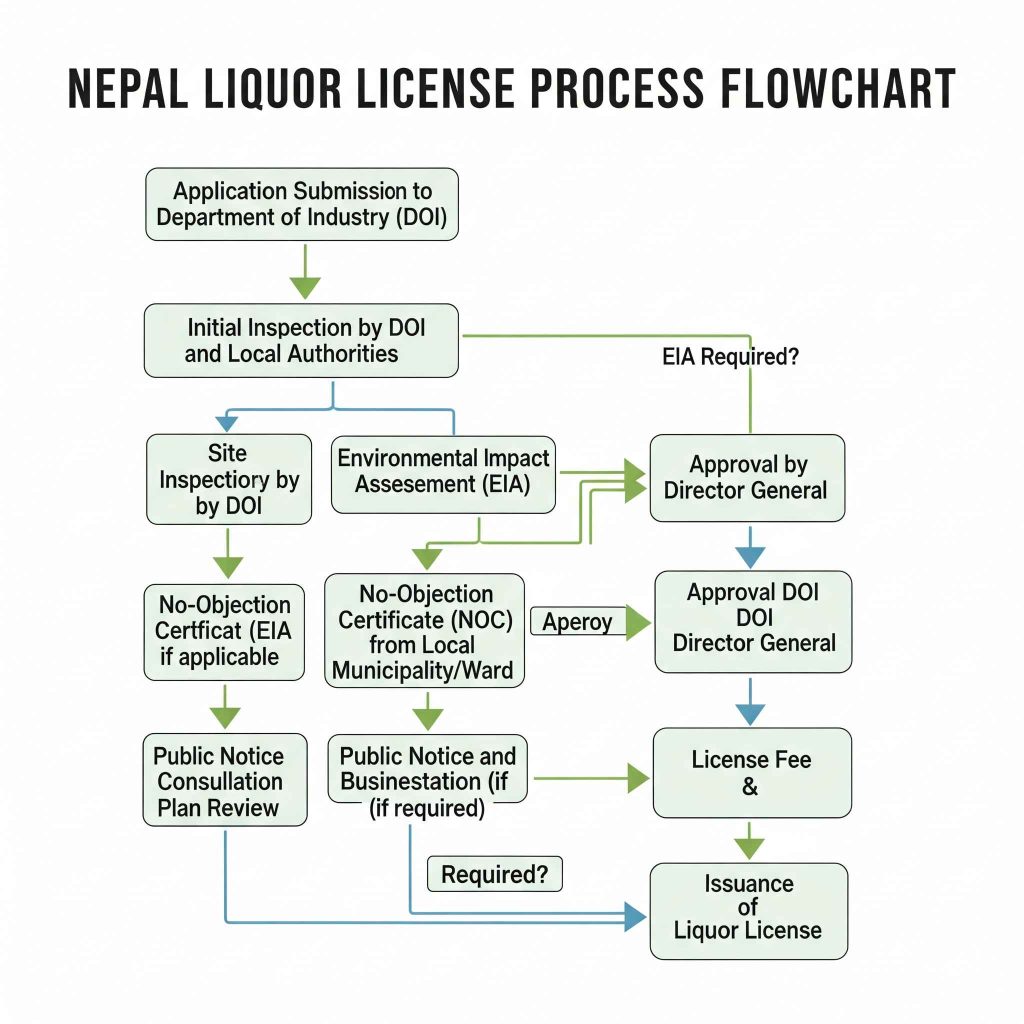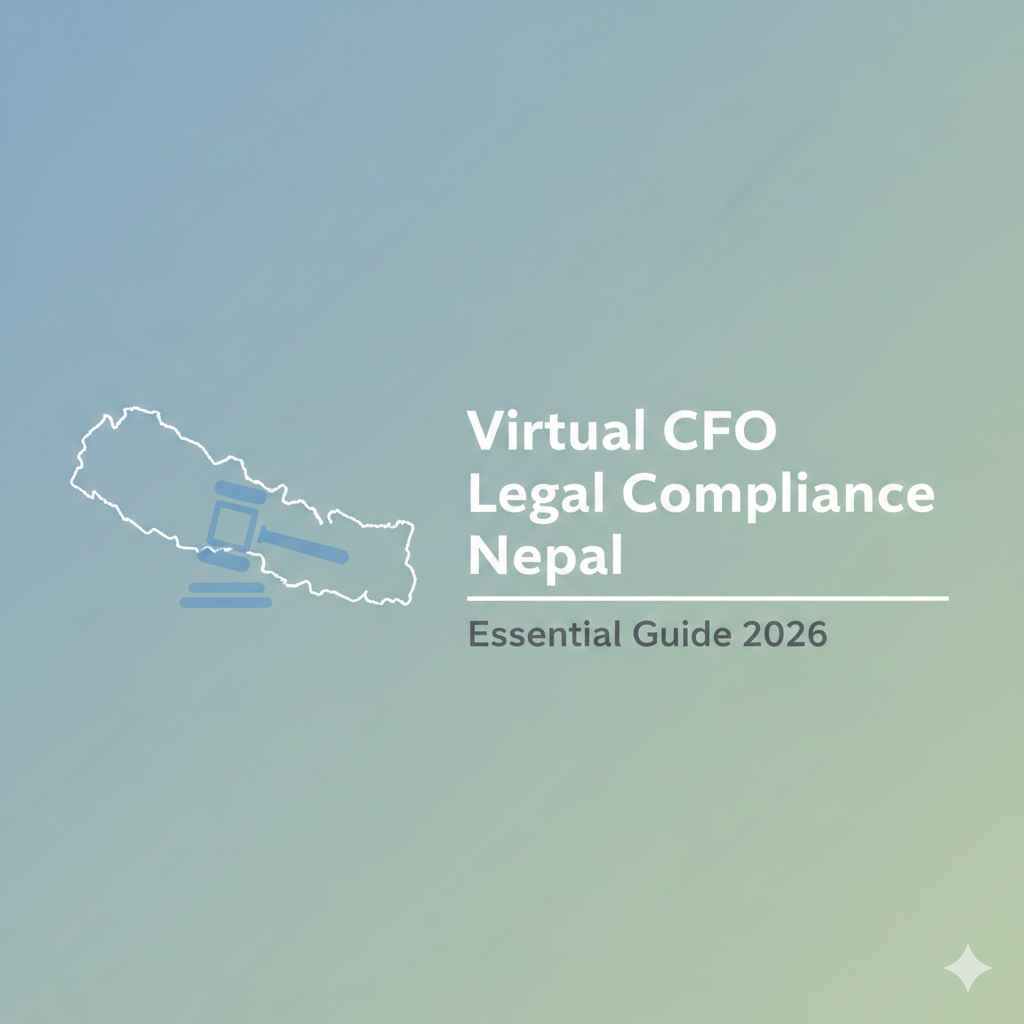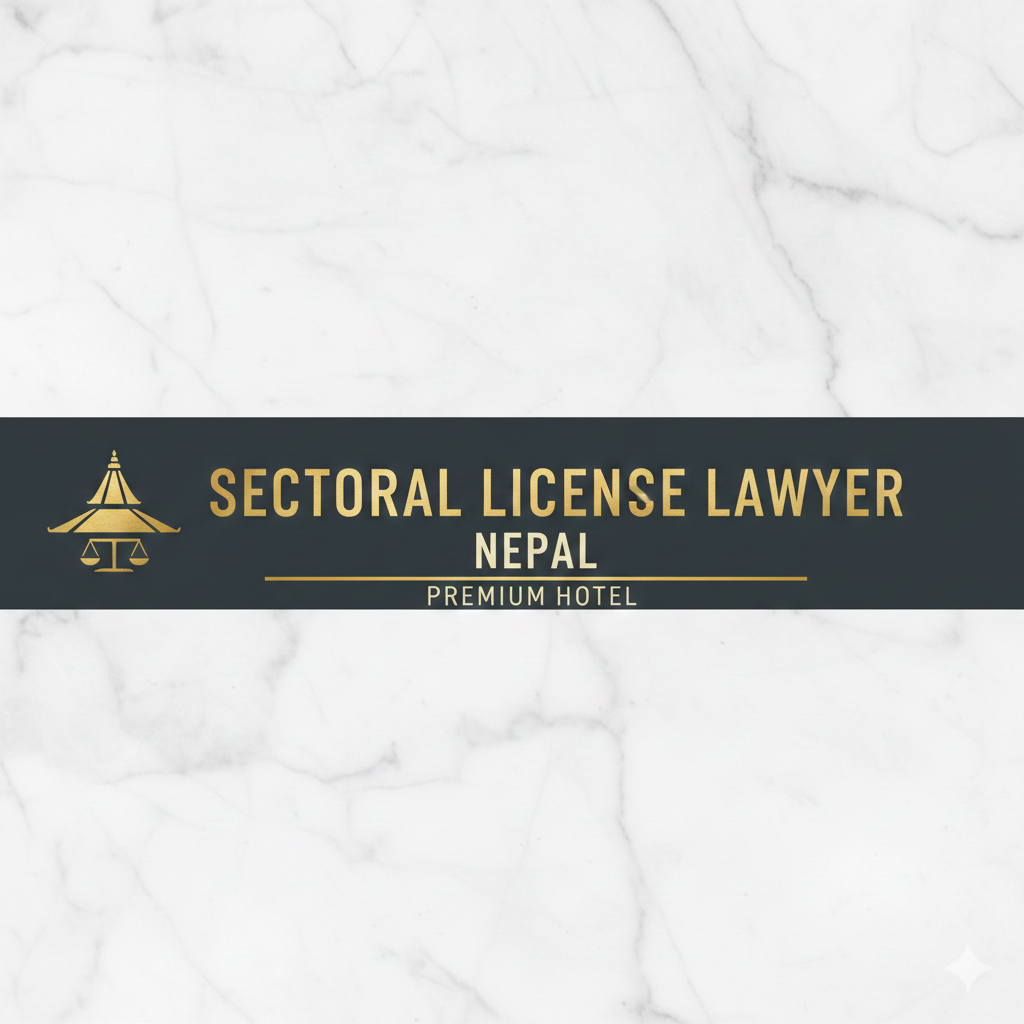
What is a Liquor License in Nepal and Why Do You Need It?
A liquor license in Nepal is a mandatory legal permit issued by the government that authorizes businesses to manufacture, distribute, sell, or import alcoholic beverages within the country. The overall aspects of liquor license are governed by the Liquor Act, 2031 B.S and the Regulations framed under it.
Essential Requirements for Liquor License Applications:
• Age Requirement: Legal age for consumption for alcohol is 18 years of age and the person below this age cannot purchase, sell or distribute the liquor.
• Operating Hours: Alcohol can only be sold and distributed between 10:00 AM and 10:00 PM.
• Packaging Restrictions: No one is allowed to make, sell, or distribute liquor in plastic pouches.
• License Categories: Separate license is required for production, distribution and retail.
What Are the Types of Liquor Licenses Available in Nepal?
The liquor license Nepal system categorizes permits based on business activities to ensure proper regulatory oversight.
Primary License Categories:
• Production License: Authorizes manufacturing of alcoholic beverages including distilleries and breweries
• Distribution License: Permits wholesale distribution of liquor products across Nepal
• Retail License: Allows direct sales to consumers through shops, restaurants, and bars
• Import/Export License: Enables international trade of alcoholic beverages
• Excise Duty Certificate: The Excise Duty Certificate must be obtained from the Inland Revenue Office. It ensures the responsible sale and distribution of alcoholic beverages by mandating annual license renewal, proper labeling, restricted sales hours, age limitations, separate sales arrangements for departmental stores, and record-keeping to prevent unauthorized transactions. It must be renewed annually.
What Documents Are Required for Liquor License Application in Nepal?
Obtaining a liquor license in Nepal requires submission of comprehensive documentation to demonstrate legal compliance and business legitimacy.
Mandatory Documentation Requirements:
• Corporate Documents: Memorandum of Association and Article of Association
• Registration Certificates: Certificate of Incorporation from Office of Company Registrar
• Tax Documentation: PAN/ VAT Certificate and Tax Clearance Certificate from Inland Revenue Office
• Identity Verification: Citizenship Certificate of Shareholders of the Business and A certified copy of the citizenship certificate of the director
• Business Planning: A detailed business action plan of the institution
• Local Authorization: Recommendation letter from the concerned local level
• Property Documentation: Rental agreement or the property ownership documents of the business premise
Education Consultancy License in Nepal
What is the Step-by-Step Process for Obtaining Liquor License in Nepal?

The liquor license Nepal application process follows a structured approach ensuring regulatory compliance and proper authorization.
Complete Application Process:
Step 1: Company Name Reservation
• Reserve the name of the Company in the Office of the Company Registrar (OCR)
• Ensure the proposed name is unique and not identical to existing companies
• Secure official name approval before proceeding
Step 2: Legal Documentation Preparation
• Prepare the Memorandum of Association and Article of Association
• Include company details, shareholder information, and operational guidelines
• Define roles, responsibilities, and business objectives clearly
Step 3: Company Registration
• Submit all documents in Office of Company Registrar for Incorporation
• Pay required registration fees and undergo document verification
• Obtain Certificate of Incorporation upon approval
Step 4: Local Government Registration
• Registration in the concerned Local Level Government
• Complete Ward Office registration requirements
• Ensure compliance with local regulations and community standards
Step 5: Tax Registration
• Registration in Inland Revenue Office for tax purpose
• Obtain VAT registration for tax compliance
• Secure PAN certificate for business operations
Step 6: Excise License Acquisition
• Obtain the Excise Duty Certificate
• Submit application with complete documentation
• Pay applicable fees and undergo inspection processes
What Legal Framework Governs Liquor Licensing in Nepal?
The liquor license in Nepal operates under a comprehensive legal structure ensuring proper regulation and control of alcoholic beverage industry.
Primary Legal Provisions:
• Fundamental Legislation: Liquor Act, 2031 (1974) – Establishes the fundamental legal framework for the production, sale, and regulation of liquor.
• Procedural Guidelines: Liquor Rules, 2033 (1976) – Provides detailed guidelines and procedures for liquor licensing and regulatory compliance.
• Local Authority Powers: Local Government Operation Act, 2074 (2017) – Grants local governments the authority to regulate liquor sales and enforce licensing requirements.
• Revenue Control: Revenue Leakage (Investigation and Control) Act, 2052 (1995) – Focuses on preventing tax evasion and ensuring proper revenue collection from the liquor industry.
Which Authorities Regulate Liquor Business Operations in Nepal?
Multiple government departments oversee liquor license Nepal compliance and enforcement activities.
Regulatory Authorities:
• Department of Revenue Investigation: Primary enforcement and compliance monitoring
• Department of Inland Revenue: Tax collection and excise duty administration
• Department of Food, Technology and Quality Control: Product quality and safety standards
• Office of the Company Registrar: Corporate registration and legal compliance
• Nepal Bureau of Standards and Meteorology: Technical standards and measurements
• Nepal Police: Law enforcement and illegal activity prevention
• Local Level Government: Community-specific regulations and permits
What Are the Compliance Requirements and Renewal Procedures?
Maintaining a valid liquor license in Nepal requires ongoing compliance with regulatory standards and periodic renewals.
Annual Compliance Obligations:
• License Renewal: Typically, licenses need to be renewed annually through the Department of Revenue Investigation (DRI)
• Regular Inspections: During this process, officials may conduct inspections to verify compliance
• Record Maintenance: Detailed transaction records and inventory management
• Tax Compliance: Timely payment of excise duties and applicable taxes
• Quality Standards: Adherence to product quality and labeling requirements
Frequently Asked Questions on Liquor License in Nepal
What is required to obtain a liquor license in Nepal?
• Submit application to authorized authority with complete documentation
• Provide Memorandum and Articles of Association
• Obtain PAN/VAT registration from tax authorities
• Secure Excise Duty Certificate from Inland Revenue Office
What documents are needed for liquor license application?
• Memorandum and Articles of Association
• Certificate of Incorporation
• PAN/VAT certificates
• Tax clearance documentation
• Citizenship certificates of shareholders and directors
• Detailed business action plan
• Property ownership or rental agreements
• Local government recommendation letters
What is the minimum legal age for alcohol consumption in Nepal?
• Legal drinking age is 18 years
• Individuals below 18 cannot purchase, sell, or distribute liquor
• Age verification is mandatory for all alcohol transactions
What are the permitted hours for alcohol sales in Nepal?
• Alcohol sales permitted between 10:00 AM and 10:00 PM daily
• Government may modify timings or restrict locations as needed
• Strict adherence to operational hours is legally required
Are plastic pouches allowed for liquor packaging in Nepal?
• Selling liquor in plastic pouches is strictly prohibited
• Violation results in penalties and legal action
• Proper packaging standards must be maintained
Do different activities require separate liquor licenses?
• Production, distribution, and retail require separate licenses
• Each activity is regulated independently
• Businesses must obtain appropriate licenses for their operations
What is the purpose of the Excise Duty Certificate?
• Ensures legal sale and distribution of alcoholic beverages
• Requires annual renewal for continued operations
• Mandates proper labeling, age restrictions, and record-keeping
Which laws govern liquor licensing in Nepal?
• Liquor Act, 2031 (1974) provides fundamental framework
• Liquor Rules, 2033 (1976) detail procedures and compliance
• Revenue Leakage Act, 2052 (1995) addresses tax compliance
Which authorities oversee liquor business operations?
• Department of Revenue Investigation • Inland Revenue Department • Food Technology and Quality Control Department • Local level government authorities • Nepal Police and Bureau of Standards
Can liquor be exported from Nepal?
• Export is permitted with proper licensing
• Requires compliance with legal regulations
• Necessary permissions from concerned authorities mandatory
Conclusion: Navigate Liquor Licensing Successfully in Nepal
Obtaining a liquor license in Nepal requires thorough understanding of legal requirements, proper documentation, and compliance with regulatory frameworks. The liquor licensing process is governed by the Liquor Act, 2031 (1974) and Liquor Rules, 2033 (1976), ensuring the legal sale, distribution, and consumption of alcohol.
Success in securing your liquor license Nepal depends on careful preparation, complete documentation, and professional guidance throughout the application process. Businesses must maintain ongoing compliance with renewal requirements, operational restrictions, and regulatory oversight to ensure continued legal operations.
Ready to start your liquor license application in Nepal? Contact experienced legal professionals who specialize in liquor licensing to ensure your application meets all regulatory requirements and achieves successful approval.
Disclaimer: This article provides general information about liquor licensing in Nepal and should not be considered legal advice. Consult qualified legal professionals for specific guidance regarding your liquor license application and compliance requirements.



